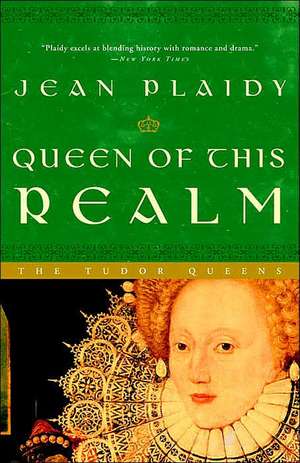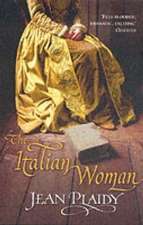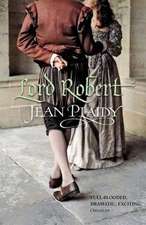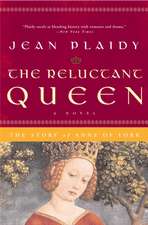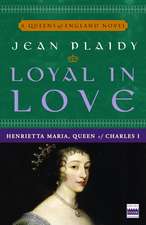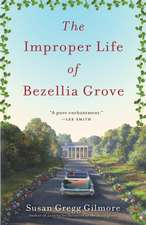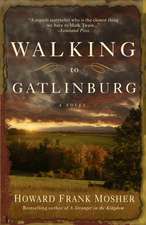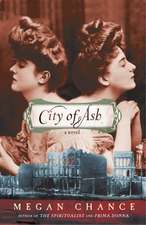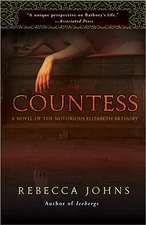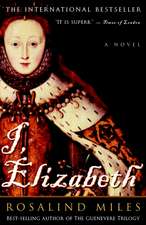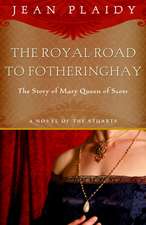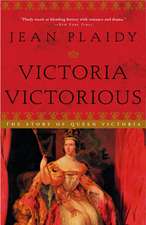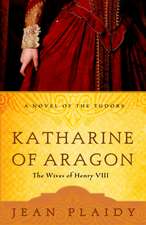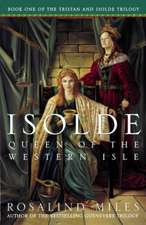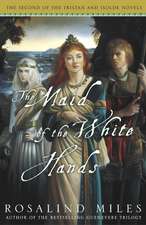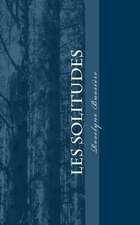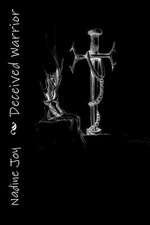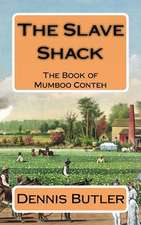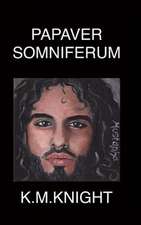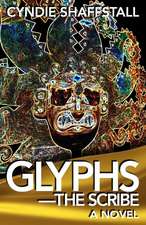Queen of This Realm: Queens of England Novel
Autor Jean Plaidyen Limba Engleză Paperback – 30 apr 2004
But in these pages, in her own voice, Elizabeth also recounts the emotional turmoil of her life: the loneliness of power; the heartbreak of her lifelong love affair with Robert Dudley, whom she could never marry; and the terrible guilt of ordering the execution of her cousin, Mary, Queen of Scots. In this unforgettable novel, Elizabeth emerges as one of the most fascinating and controversial women in history, and as England’s greatest monarch.
Preț: 112.23 lei
Nou
Puncte Express: 168
Preț estimativ în valută:
21.48€ • 23.34$ • 18.06£
21.48€ • 23.34$ • 18.06£
Carte disponibilă
Livrare economică 31 martie-14 aprilie
Preluare comenzi: 021 569.72.76
Specificații
ISBN-13: 9780609810200
ISBN-10: 0609810200
Pagini: 480
Dimensiuni: 133 x 204 x 27 mm
Greutate: 0.35 kg
Ediția:Rivers PR PB.
Editura: BROADWAY BOOKS
Seria Queens of England Novel
ISBN-10: 0609810200
Pagini: 480
Dimensiuni: 133 x 204 x 27 mm
Greutate: 0.35 kg
Ediția:Rivers PR PB.
Editura: BROADWAY BOOKS
Seria Queens of England Novel
Notă biografică
JEAN PLAIDY, one of the preeminent authors of historical fiction for most of the twentieth century, is the pen name of the prolific English author Eleanor Hibbert, also known as Victoria Holt. Jean Plaidy’s novels had sold more than 14 million copies worldwide by the time of her death in 1993.
Extras
WHEN I LOOK BACK OVER THE FIRST TWENTY-FIVE YEARS of my life and consider the number of times I was in danger of losing it, I believe--as I have since that wonderful day when I rode into my capital city in a riding dress of purple velvet, beside me my Master of Horse, Robert Dudley, the most handsome man in England, and listened to the guns of the Tower greeting me, and saw the flowers strewn in my path--yes, I fervently believe that my destiny was to be a great queen. I swore to God then that nothing should ever stand in the way of my fulfilling it. And I have kept that vow.
I could rejoice in those early twenty-five years--and indeed all through my life have done so--because during them I learned many a bitter lesson and it has been my endeavor never to forget one of them. I was young, lacking experience in the ways of men and women; and over my defenseless head--as dangerously as it ever did over that of Damocles--hung the sword of destruction. One false step, one thoughtless word, even a smile or a frown and down would come that sword depriving me of my life.
I was not quite three years old when I had my first encounter with adversity and my fortunes changed drastically. I cannot say with truth that I remember a great deal about my mother though sometimes I fancy I do. In my mind I see the most brilliantly fascinating person I have ever known. I sense the soft touch of velvet and the rustle of silk, long perfumed dark hair and a wild sort of gaiety born of desperation. But there is one image of her which remains vividly in my mind and as long as I live I will never forget it. I am in a courtyard and my fascinating mother is holding me in her arms. At one of the windows there appears a glittering figure--large, imposing, red-bearded. It is the King and she is trying to say something to him through me. She is holding my hand and waving it at him, appealingly, desperately. For a brief second he regards us with exasperated indifference before he turns away. That actually happened. Later I discovered it took place three or four days before she was arrested and taken to the Tower. The memory of her desperation and his cruel indifference stays with me forever, and I vowed that no man should ever do to me what my father did to my mother.
Before that she had been a presence of power, and my governess Lady Bryan, who was a kinswoman of hers, was overwhelmingly anxious to please her as was Mr. Shelton who was also a family connection. My mother looked after her own when she had the power to do so. But there came that bewildering sadness . . . the end of her visits . . . the days when I asked for her, and Lady Bryan turned away to hide her emotion.
My father was a more tangible presence. I thought he was the most powerful man in the world. He certainly was in England. I was fourteen when he died so I could say I knew him fairly well. He was one who inspired fear and yet affection with it, and despite all his cruelty and all his ruthlessness he never lost the love of his people. That was one way in which I intended to emulate him. I learned from my studies of our history that it is a foolish monarch who loses the esteem of the common people.
Lady Bryan told me that my father had once been very proud of me and used to stroll in the gardens at Hampton Court or Windsor--wherever the Court happened to be--holding me in his arms. I liked that picture--myself magnificently attired swinging high in the arms of a splendid king as his courtiers walked with him exclaiming at my perfections.
That ended with an executioner's sword which severed my mother's beautiful head from her willowy body.
What I do remember clearly is catching Lady Bryan by the skirts and demanding: "Where is my mother? Why does she never come now?"
And when she tried to run away to weep in silence, I refused to relinquish her and insisted she tell me. She took me onto her knee and said: "My Lady Princess, you have no mother now."
"Everybody has a mother," I said, for I was logical as soon as I was old enough to reason.
"Your mother has gone to Heaven," she said.
"When will she come back?"
"People do not come back from Heaven."
"She will come to see me."
Lady Bryan held me to her and wept so bitterly that she bewildered me.
Then I began to realize that something terrible had happened but it was a long time before I gave up hope of seeing my mother again.
I talked of her with Lady Bryan and made her tell me about my birth.
"It was in Greenwich Palace," she said, "a beautiful palace and one of the favorites of the King and Queen. You first saw the light of day in the Chamber of Virgins. It was given that name afterward, but before you arrived it was just a chamber the walls of which were lined with tapestry and this tapestry depicted the lives of the holy virgins."
"Did my mother want a boy?" I must have heard some whisper of a servant to put that into my head. It was important, I knew, for Lady Bryan turned pale, and for a moment or so did not answer.
Then she said: "She wanted a boy. The King wanted a boy. But as soon as you were born they knew that you were just what they wanted."
I was soon to discover how false that was, but I loved Lady Bryan for telling the lie. My mother's life had depended on her giving birth to a boy. If I had been a son, they would not have sent to France for that sword which cut off her head. She would have been an honored queen instead of a corpse lying in her grave in the Church of St Peter ad Vincula.
"The Queen said," went on Lady Bryan, "people will now with reason call this room the Chamber of Virgins, for a virgin is now born in it on the vigil of this auspicious day on which the Church commemorates the nativity of the Holy Virgin."
"Was that what she said?" I asked wonderingly.
"It was. You were born on the eve of the Virgin Mary's birth. Just think of that."
My dear governess did so much to comfort me, but even she could not keep the truth from me. I could not but know that I who had been the important Lady Princess was now of no consequence and few cared what became of me. My mother was dead, executed for treason against the King because she was accused of taking five lovers--one her own brother, my uncle George Boleyn. Her marriage to the King had been proved by Thomas Cromwell--the King's influential minister--to have been no marriage at all, and because of this I was branded illegitimate. And naturally bastards of the King were not of the same importance as his legitimate offspring.
I began to notice the change when my gowns and kirtles grew thin and threadbare and Lady Bryan spent long hours trying to patch them.
"I don't like this old dress," I grumbled. "Why cannot I have a new one?"
At which the good Lady Bryan turned away to hide her anger against somebody--certainly not me, for she took me in her arms and said I was her Lady Princess and always would be.
She was very angry with Mr. Shelton, who had a high place in my household, because he insisted that I should sit at table in some ceremony and would give me wine and help me to highly seasoned dishes. I heard Lady Bryan quarreling with him. "It is unsuitable to let the child eat such foods," she said.
Mr. Shelton replied: "This is no ordinary child. Remember she is the King's daughter."
"Oh, he still acknowledges her as that, does he?" Lady Bryan spoke angrily. "I am glad of that! Do you know, Mr. Shelton, it is months since that child had new garments. I cannot go on patching forever."
"I repeat she is the King's daughter and we should never forget that. Who knows . . ."
"Just what is your implication, Mr. Shelton?"
He did not reply. I kept my eyes and ears open and because I knew strange matters were being decided outside my nursery I began to realize that for some reason Mr. Shelton was trying hard to win my good graces and wean my affection from Lady Bryan. He never denied me anything that he could and he was always most obsequious.
At first I thought what a nice man he was and then when I discovered that Lady Bryan restricted me and meted out her little punishments because she felt it was her duty to do so, I did not like Mr. Shelton so much; and whatever disagreement there was between us I always turned back to Lady Bryan when I was in need of comfort.
Mr. Shelton, like Lady Bryan, was related to my mother, and that was the reason why they were at Hunsdon in my household. Those two were in constant conflict. Once I heard Lady Bryan declare to him: "You want to keep my Lady in royal state as long as you can, do you not, Master Shelton? But I tell you this: it will avail you little. There has been a new Queen now ever since the death of Queen Anne, and she is with child, and if that child should prove to be a boy . . . what of our lady then?"
"But what if it is not a boy eh?" demanded Mr. Shelton. "What if Queen Jane goes the way of Queen Anne."
"Hush," said Lady Bryan. "Such words are treason and should never be spoken. All I ask of you is not to indulge the child. Do you not understand that these highly seasoned foods are bad for her digestion? I believe you give her sweetmeats outside meals, and if you do not desist from such I shall be forced to make complaints where they could come to the ears of the King."
Mr. Shelton was unimpressed and I learned later that she did write to Thomas Cromwell himself, telling him that I had neither gown nor kirtle, nor any manner of linen, and begging him to send something for me to wear. She also complained of Mr. Shelton's insistence that I sit at table where spiced foods were served and suggested that I have plain wholesome food served in a way suitable for a child of my age.
I did get some new clothes but I think that may have been due to the intervention of my sister Mary. She was twenty years of age at that time, which seemed very old to me. She was pleasant-looking and very serious, spending a great deal of time on her knees. An example to me, said Lady Bryan, for I was far less dedicated to my religious studies than Mary had been as a child. (Lady Bryan had been her governess, too, so she could speak with conviction.) I was interested in so many things and asked too many questions, I was told. "There are matters which must be accepted without question," said Lady Bryan. "One's faith for one, loyalty to the King for another." Even at that stage I was beginning to have doubts of sustaining either.
Lady Mary's mother, Katharine of Aragon, had died a few months before my own, and my sister was stricken with grief because they had been especially devoted to each other. Before her mother's death Mary had not liked me at all. On the rare occasions when we had met, young as I was, I had sensed that my presence angered her. Now it was different. We had both lost our mothers; both had died outside the King's favor; we were both branded bastards. It was because of her uncertain position that Mary was not married, and it was strange for a King's daughter to reach the age of twenty without having a husband found for her. But now she was quite tender toward me and since I tried to please her we were becoming friends. When one has no mother and one's father is a king whom one rarely sees, it is very pleasant to have a sister. I hoped Mary felt this too.
I was very sad when Mary left Hunsdon but she was delighted to go, for Queen Jane had asked for her to go to Court. Much of this I learned later. Because of my extreme youth I must have been very much in the dark at this time. It was when Katharine Champernowne came to be my governess that I made my discoveries through her. Katharine--I was soon calling her Kat--was the most indiscreet and delightful person I had ever known and I grew to love her dearly.
It appeared that the King could deny his new wife nothing; fair where my mother was dark, docile where she was vivacious, Queen Jane was the greatest possible contrast to Queen Anne for whom out of the white heat of his passion had grown a burning hatred. Moreover Jane was almost immediately pregnant after her marriage, which took place, most shamefully, ten days after my mother's death by the sword.
Queen Jane, it seemed, asked the King if Mary could come to Court and be with her during her pregnancy.
"She shall come to thee, darling," Kat told me he said; and so gladly Mary went.
I missed her, but like everyone else I wanted to hear of the birth of the child.
When Lady Bryan took me to her own private chamber, I knew I was going to learn something important. She put her arms round me and drew me close to her.
"The Queen has given birth to a son," she said. "The King and the whole country are very happy."
I felt my face go hard as it did when I was angry. Lady Bryan had told me of it many times. "A bad habit," she said, "and one which can bring you no good." I tried to curb it but on this occasion it was difficult, for how could I prevent the resentment which rose in me when I heard another than my mother called the Queen? Moreover this new Jane had given birth to a boy--the son which I should have been.
"The bells are ringing all over the country," said Lady Bryan. "The King is so happy. This little boy will one day be King though, God willing, not for a very long time. His Grace the King has sent word to Mr. Shelton and to me that you are to have the very special honor of carrying the chrisom at the christening. There! What do you think of that?"
I could rejoice in those early twenty-five years--and indeed all through my life have done so--because during them I learned many a bitter lesson and it has been my endeavor never to forget one of them. I was young, lacking experience in the ways of men and women; and over my defenseless head--as dangerously as it ever did over that of Damocles--hung the sword of destruction. One false step, one thoughtless word, even a smile or a frown and down would come that sword depriving me of my life.
I was not quite three years old when I had my first encounter with adversity and my fortunes changed drastically. I cannot say with truth that I remember a great deal about my mother though sometimes I fancy I do. In my mind I see the most brilliantly fascinating person I have ever known. I sense the soft touch of velvet and the rustle of silk, long perfumed dark hair and a wild sort of gaiety born of desperation. But there is one image of her which remains vividly in my mind and as long as I live I will never forget it. I am in a courtyard and my fascinating mother is holding me in her arms. At one of the windows there appears a glittering figure--large, imposing, red-bearded. It is the King and she is trying to say something to him through me. She is holding my hand and waving it at him, appealingly, desperately. For a brief second he regards us with exasperated indifference before he turns away. That actually happened. Later I discovered it took place three or four days before she was arrested and taken to the Tower. The memory of her desperation and his cruel indifference stays with me forever, and I vowed that no man should ever do to me what my father did to my mother.
Before that she had been a presence of power, and my governess Lady Bryan, who was a kinswoman of hers, was overwhelmingly anxious to please her as was Mr. Shelton who was also a family connection. My mother looked after her own when she had the power to do so. But there came that bewildering sadness . . . the end of her visits . . . the days when I asked for her, and Lady Bryan turned away to hide her emotion.
My father was a more tangible presence. I thought he was the most powerful man in the world. He certainly was in England. I was fourteen when he died so I could say I knew him fairly well. He was one who inspired fear and yet affection with it, and despite all his cruelty and all his ruthlessness he never lost the love of his people. That was one way in which I intended to emulate him. I learned from my studies of our history that it is a foolish monarch who loses the esteem of the common people.
Lady Bryan told me that my father had once been very proud of me and used to stroll in the gardens at Hampton Court or Windsor--wherever the Court happened to be--holding me in his arms. I liked that picture--myself magnificently attired swinging high in the arms of a splendid king as his courtiers walked with him exclaiming at my perfections.
That ended with an executioner's sword which severed my mother's beautiful head from her willowy body.
What I do remember clearly is catching Lady Bryan by the skirts and demanding: "Where is my mother? Why does she never come now?"
And when she tried to run away to weep in silence, I refused to relinquish her and insisted she tell me. She took me onto her knee and said: "My Lady Princess, you have no mother now."
"Everybody has a mother," I said, for I was logical as soon as I was old enough to reason.
"Your mother has gone to Heaven," she said.
"When will she come back?"
"People do not come back from Heaven."
"She will come to see me."
Lady Bryan held me to her and wept so bitterly that she bewildered me.
Then I began to realize that something terrible had happened but it was a long time before I gave up hope of seeing my mother again.
I talked of her with Lady Bryan and made her tell me about my birth.
"It was in Greenwich Palace," she said, "a beautiful palace and one of the favorites of the King and Queen. You first saw the light of day in the Chamber of Virgins. It was given that name afterward, but before you arrived it was just a chamber the walls of which were lined with tapestry and this tapestry depicted the lives of the holy virgins."
"Did my mother want a boy?" I must have heard some whisper of a servant to put that into my head. It was important, I knew, for Lady Bryan turned pale, and for a moment or so did not answer.
Then she said: "She wanted a boy. The King wanted a boy. But as soon as you were born they knew that you were just what they wanted."
I was soon to discover how false that was, but I loved Lady Bryan for telling the lie. My mother's life had depended on her giving birth to a boy. If I had been a son, they would not have sent to France for that sword which cut off her head. She would have been an honored queen instead of a corpse lying in her grave in the Church of St Peter ad Vincula.
"The Queen said," went on Lady Bryan, "people will now with reason call this room the Chamber of Virgins, for a virgin is now born in it on the vigil of this auspicious day on which the Church commemorates the nativity of the Holy Virgin."
"Was that what she said?" I asked wonderingly.
"It was. You were born on the eve of the Virgin Mary's birth. Just think of that."
My dear governess did so much to comfort me, but even she could not keep the truth from me. I could not but know that I who had been the important Lady Princess was now of no consequence and few cared what became of me. My mother was dead, executed for treason against the King because she was accused of taking five lovers--one her own brother, my uncle George Boleyn. Her marriage to the King had been proved by Thomas Cromwell--the King's influential minister--to have been no marriage at all, and because of this I was branded illegitimate. And naturally bastards of the King were not of the same importance as his legitimate offspring.
I began to notice the change when my gowns and kirtles grew thin and threadbare and Lady Bryan spent long hours trying to patch them.
"I don't like this old dress," I grumbled. "Why cannot I have a new one?"
At which the good Lady Bryan turned away to hide her anger against somebody--certainly not me, for she took me in her arms and said I was her Lady Princess and always would be.
She was very angry with Mr. Shelton, who had a high place in my household, because he insisted that I should sit at table in some ceremony and would give me wine and help me to highly seasoned dishes. I heard Lady Bryan quarreling with him. "It is unsuitable to let the child eat such foods," she said.
Mr. Shelton replied: "This is no ordinary child. Remember she is the King's daughter."
"Oh, he still acknowledges her as that, does he?" Lady Bryan spoke angrily. "I am glad of that! Do you know, Mr. Shelton, it is months since that child had new garments. I cannot go on patching forever."
"I repeat she is the King's daughter and we should never forget that. Who knows . . ."
"Just what is your implication, Mr. Shelton?"
He did not reply. I kept my eyes and ears open and because I knew strange matters were being decided outside my nursery I began to realize that for some reason Mr. Shelton was trying hard to win my good graces and wean my affection from Lady Bryan. He never denied me anything that he could and he was always most obsequious.
At first I thought what a nice man he was and then when I discovered that Lady Bryan restricted me and meted out her little punishments because she felt it was her duty to do so, I did not like Mr. Shelton so much; and whatever disagreement there was between us I always turned back to Lady Bryan when I was in need of comfort.
Mr. Shelton, like Lady Bryan, was related to my mother, and that was the reason why they were at Hunsdon in my household. Those two were in constant conflict. Once I heard Lady Bryan declare to him: "You want to keep my Lady in royal state as long as you can, do you not, Master Shelton? But I tell you this: it will avail you little. There has been a new Queen now ever since the death of Queen Anne, and she is with child, and if that child should prove to be a boy . . . what of our lady then?"
"But what if it is not a boy eh?" demanded Mr. Shelton. "What if Queen Jane goes the way of Queen Anne."
"Hush," said Lady Bryan. "Such words are treason and should never be spoken. All I ask of you is not to indulge the child. Do you not understand that these highly seasoned foods are bad for her digestion? I believe you give her sweetmeats outside meals, and if you do not desist from such I shall be forced to make complaints where they could come to the ears of the King."
Mr. Shelton was unimpressed and I learned later that she did write to Thomas Cromwell himself, telling him that I had neither gown nor kirtle, nor any manner of linen, and begging him to send something for me to wear. She also complained of Mr. Shelton's insistence that I sit at table where spiced foods were served and suggested that I have plain wholesome food served in a way suitable for a child of my age.
I did get some new clothes but I think that may have been due to the intervention of my sister Mary. She was twenty years of age at that time, which seemed very old to me. She was pleasant-looking and very serious, spending a great deal of time on her knees. An example to me, said Lady Bryan, for I was far less dedicated to my religious studies than Mary had been as a child. (Lady Bryan had been her governess, too, so she could speak with conviction.) I was interested in so many things and asked too many questions, I was told. "There are matters which must be accepted without question," said Lady Bryan. "One's faith for one, loyalty to the King for another." Even at that stage I was beginning to have doubts of sustaining either.
Lady Mary's mother, Katharine of Aragon, had died a few months before my own, and my sister was stricken with grief because they had been especially devoted to each other. Before her mother's death Mary had not liked me at all. On the rare occasions when we had met, young as I was, I had sensed that my presence angered her. Now it was different. We had both lost our mothers; both had died outside the King's favor; we were both branded bastards. It was because of her uncertain position that Mary was not married, and it was strange for a King's daughter to reach the age of twenty without having a husband found for her. But now she was quite tender toward me and since I tried to please her we were becoming friends. When one has no mother and one's father is a king whom one rarely sees, it is very pleasant to have a sister. I hoped Mary felt this too.
I was very sad when Mary left Hunsdon but she was delighted to go, for Queen Jane had asked for her to go to Court. Much of this I learned later. Because of my extreme youth I must have been very much in the dark at this time. It was when Katharine Champernowne came to be my governess that I made my discoveries through her. Katharine--I was soon calling her Kat--was the most indiscreet and delightful person I had ever known and I grew to love her dearly.
It appeared that the King could deny his new wife nothing; fair where my mother was dark, docile where she was vivacious, Queen Jane was the greatest possible contrast to Queen Anne for whom out of the white heat of his passion had grown a burning hatred. Moreover Jane was almost immediately pregnant after her marriage, which took place, most shamefully, ten days after my mother's death by the sword.
Queen Jane, it seemed, asked the King if Mary could come to Court and be with her during her pregnancy.
"She shall come to thee, darling," Kat told me he said; and so gladly Mary went.
I missed her, but like everyone else I wanted to hear of the birth of the child.
When Lady Bryan took me to her own private chamber, I knew I was going to learn something important. She put her arms round me and drew me close to her.
"The Queen has given birth to a son," she said. "The King and the whole country are very happy."
I felt my face go hard as it did when I was angry. Lady Bryan had told me of it many times. "A bad habit," she said, "and one which can bring you no good." I tried to curb it but on this occasion it was difficult, for how could I prevent the resentment which rose in me when I heard another than my mother called the Queen? Moreover this new Jane had given birth to a boy--the son which I should have been.
"The bells are ringing all over the country," said Lady Bryan. "The King is so happy. This little boy will one day be King though, God willing, not for a very long time. His Grace the King has sent word to Mr. Shelton and to me that you are to have the very special honor of carrying the chrisom at the christening. There! What do you think of that?"
Descriere
Plaidy presents Elizabeth I, England's greatest monarch, in the many stages of her dramatic life a bewildered, motherless child of an all-powerful father, a captive in the Tower of London, a would-be lover frustrated by the exigencies of politics and power, and eventually, the icon of her era.
